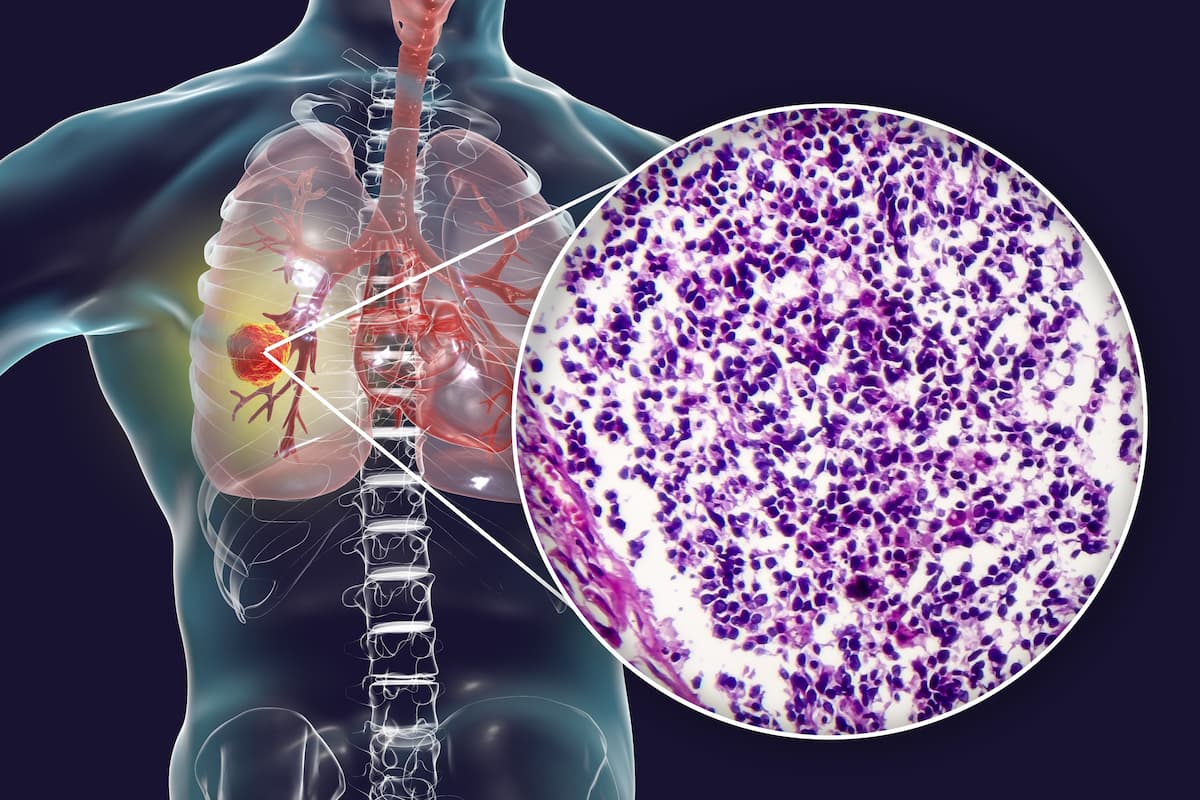Sitravatinib/Nivolumab Fails to Improve Survival Vs Docetaxel in NSCLC
Patients with nonsquamous non–small cell lung cancer experiencing clinical benefit with sitravatinib plus nivolumab in the phase 3 SAPPHIRE trial are eligible to remain on treatment.
Treatment with sitravatinib (Sitra) plus nivolumab (Opdivo) in the phase 3 SAPPHIRE trial (NCT03906071) did not improve the primary end point of overall survival (OS) compared with docetaxel in the second- or third-line treatment of patients with advanced non–small cell lung cancer (NSCLC) who progressed on prior therapy, according to a press release on the study’s final analysis.1
According to its manufacturers, sitravatinib is currently under investigation in multiple clinical trials in the treatment of patients who are resistant to prior immune checkpoint inhibitor therapy and have progressed on platinum doublet therapy.

Investigators plan to share detailed findings from the SAPPHIRE trial in the future. Patients who are experiencing clinical benefit and would like to remain on therapy with sitravatinib plus nivolumab are eligible to continue study treatment.
“As we move forward, we are optimistic about our ability to positively impact the lives of patients living with cancer through the advancement of our broad and differentiated pipeline of targeted oncology programs,” Alan Sandler, MD, chief medical officer of Mirati Therapeutics, said in the press release.
The investigational spectrum-selective kinase inhibitor sitravatinib potently inhibits receptor tyrosine kinases (RTKs), including TAM family receptors, split family receptors, and RET. The agent’s potent ability to inhibit TAM and split family RTKs is hypothesized to overcome resistance to checkpoint inhibitors through targeted reversal of an immunosuppressive microenvironment, thereby enhancing antigen-specific T-cell responses while expanding dendritic cell-dependent antigen presentation.
According to its manufacturers, sitravatinib is currently under investigation in multiple clinical trials in the treatment of patients who are resistant to prior immune checkpoint inhibitor therapy and have progressed on platinum doublet therapy. Additionally, the agent is under evaluation in combination with checkpoint inhibitors in select checkpoint inhibitor–naïve patients.
In the randomized phase 3 SAPPHIRE trial, investigators assessed the efficacy of nivolumab plus sitravatinib compared with docetaxel in patients with advanced nonsquamous NSCLC. The study had an estimated enrollment of 532 patients. Those who enrolled were randomly assigned to receive 240 mg of intravenous nivolumab every 2 weeks or 480 mg every 4 weeks plus oral sitravatinib capsules once daily or 75 mg/m2 of intravenous docetaxel over 1 hour every 3 weeks.
Secondary end points of the SAPPHIRE trial included adverse effects, objective response rate per RECIST v1.1 criteria, and progression-free survival.
Patients 18 years and older with a diagnosis of nonsquamous NSCLC and receipt of 1 or 2 lines of treatment in the advanced setting were eligible for enrollment on the trial. Additional eligibility criteria included having prior treatment with PD-1 or PD-L1 checkpoint inhibitor therapy and platinum-based chemotherapy in combination or in sequence, a checkpoint inhibitor with radiographic disease progression on or after the most recent treatment regimen, and being a candidate to receive docetaxel as second- or third-line therapy.
Patients with uncontrolled brain metastases or tumors positive for EGFR, ROS1, and ALK mutations or fusions were unable to enroll. Patients were also unsuitable for enrollment if they had unacceptable toxicity following prior checkpoint inhibitor therapy, received systemic anti-cancer therapy after checkpoint inhibitor therapy other than maintenance chemotherapy, or impaired heart function.
Previously, investigators of the phase 3 SAPPHIRE trial gave an update on findings from the interim analysis for OS in December 2022.2 The investigators indicated that they would be moving onto the study’s final analysis based on the interim analysis findings.
“We remain committed to developing our portfolio of oncology candidates and advancing our lung cancer strategy to positively impact the lives of patients with cancer,” Charles Baum, MD, PhD, president, founder, and head of research and development at Mirati, said at the time of the interim OS analysis.
References
- Mirati Therapeutics provides update on the phase 3 SAPPHIRE study evaluating sitravatinib in combination with OPDIVO®. News release. Mirati Therapeutics. May 24, 2023. Accessed May 25, 2023. bit.ly/3IDUJud
- Mirati Therapeutics announces update for the phase 3 SAPPHIRE study. News release. Mirati Therapeutics. December 2, 2022. Accessed May 25, 2023. bit.ly/42bzLtw